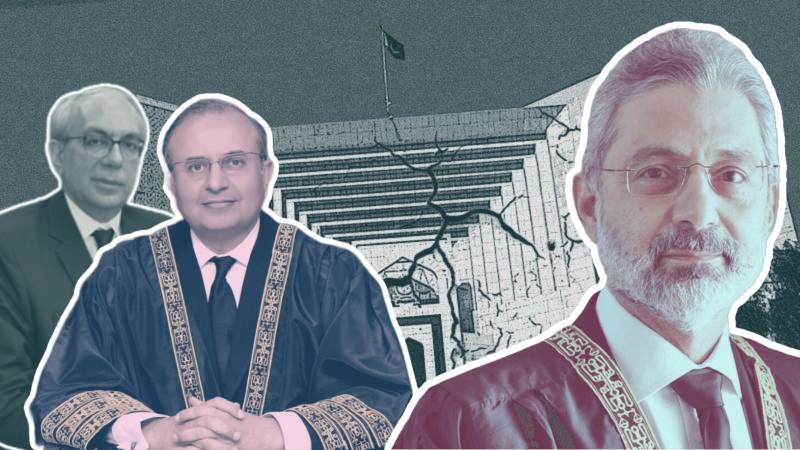The division and grouping among the Supreme Court judges have become publicly apparent, with Justice Mansoor Ali Shah followed by Justice Muneeb Akhtar now taking a stand against Chief Justice Qazi Faez Isa. Justice Muneeb Akhtar has refused to acknowledge the newly constituted benches under the new Practice and Procedure Ordinance Committee and has excused himself from hearing the review petition of Article 63-A, which has been pending for two years under the Chief Justice’s leadership. Following his refusal, Justice Muneeb, a prominent member of the group of senior Supreme Court judges, has once again become a hindrance to the government securing a two-thirds majority. However, Chief Justice Isa has expressed his determination to resolve the review petition of Article 63-A, hinting at forming a new bench if Justice Muneeb remains uncooperative.
It is noteworthy that the hearing for the review petitions on the decision not to count the votes of defecting parliamentarians was postponed due to Justice Muneeb’s absence. The Chief Justice has indicated that efforts will be made to convince him, and if he does not join, a new bench will be constituted. During the review hearing of the interpretation of Article 63-A, Chief Justice Isa, along with Justices Aminuddin, Jamal Mandokhail, and Mazhar Alam, attended the court, but Justice Muneeb Akhtar was notably absent.
Chief Justice Qazi Faez Isa summoned the Attorney General to the rostrum, remarking that a larger bench was constituted today for the case. A five-member bench had previously delivered the judgement on the case. Justice Muneeb Akhtar had written a letter to the Supreme Court’s Registrar, which the Chief Justice read aloud during the proceedings.
In his letter, Justice Muneeb clarified that he was not excusing himself from hearing the case, stating that once a bench is formed, any excuse should only be made in court. He expressed that since the bench was formed by the Practice and Procedure Committee, he could not be a part of it. He further explained that his refusal to sit on the bench should not be misconstrued and requested that his letter be made part of the review case record.
Chief Justice Isa remarked that there is no precedent for making such letters part of the judicial record and that Justice Muneeb’s letter could not be added to the court file. He stated that it would have been appropriate for Justice Muneeb to attend the bench and present his opinion, as dissenting views are always encouraged. The review case has been pending for over two years, and the Chief Justice highlighted the importance of Article 63-A. He reiterated that a judge’s refusal to hear a case should take place in the court, although he respected Justice Muneeb’s opinion.
The five-member bench, led by former Chief Justice Umar Ata Bandial, had heard the case, delivering a 3-2 majority verdict on Article 63-A. The Chief Justice also noted that the law requires that the same bench that gave the judgement should hear the review petitions. He replaced former Chief Justice Bandial and included Justice Aminuddin in place of Justice Ijaz-ul-Ahsan. The Chief Justice expressed hope that Justice Muneeb would rejoin the bench, but if he does not, the bench will be reconstituted. Regardless of whether Justice Muneeb joins the bench, the case will proceed today.
The Supreme Court has postponed the hearing on the review petitions for the interpretation of Article 63-A until 11:30 AM today.
It is worth recalling that during the previous government of PTI, a presidential reference was sent to interpret Article 63-A. The Supreme Court’s 3-2 majority ruling declared that votes cast by defecting members would not be counted. Justice Muneeb Akhtar authored the majority opinion, while Justices Jamal Khan Mandokhail and Mazhar Alam Mian disagreed with it. On 17th May 2022, the Supreme Court ruled that any vote cast against party policy by a defecting member would not be counted, with the disqualification period to be determined by the parliament. This 3-2 majority decision was delivered by a five-member bench led by then Chief Justice Umar Ata Bandial, concluding that not only would defecting members’ votes not be counted, but they would also face disqualification.
